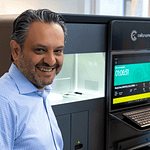Catching a cancer relapse before any scan could see it is the ultimate goal for minimal residual disease or MRD testing. And it’s the promise behind Foresight Diagnostics, a Stanford spin-out co-founded by scientist Jake Chabon and oncologist David Kurtz who say they have arrived at “next gen” MRD testing. In this debut interview, Jake and Dave walk us through their journey from academic research to launching one of the most sensitive MRD tests on the market—one that’s already shaped new NCCN guidelines.
0:00 Origin story
4:45 What makes this “next gen?”
10:15 How do you get the leap in sensitivity
15:45 Already had an impact on NCCN guidelines
23:00 Launching lymphoma texting next year, then on to solid tumors
28:00 How will this change standard of care?
Jake explains how their novel PhasED-Seq technology, which tracks “phased variants”—usually two or three mutations on the same DNA molecule—enables unprecedented sensitivity, detecting cancer cells at levels as low as one part in 10 million. “It’s extremely unlikely to have two concurrent sequencing errors,” says Jake. “That’s functionally the core insight here.”
For Dave, who still treats lymphoma patients, the clinical need is personal. “Our goal is to treat patients until there are no more cancer cells in the body. So having a tool that tells you when there are no more cancer cells left is kind of our holy grail.”
Their MRD test, called Foresight CLARITY, launches first for lymphoma next year, with solid tumor applications in development. As their data have already begun to reshape the standard of care, Jake and Dave discuss a future in which MRD testing could come before PET scans—or even replace them.
“We want MRD testing to become the standard of care across all cancers treated with curative intent,” says Jake. With Foresight CLARITY already in three prospective trials and in NCCN guidelines, and a clear clinical need, that vision may not be far off.











